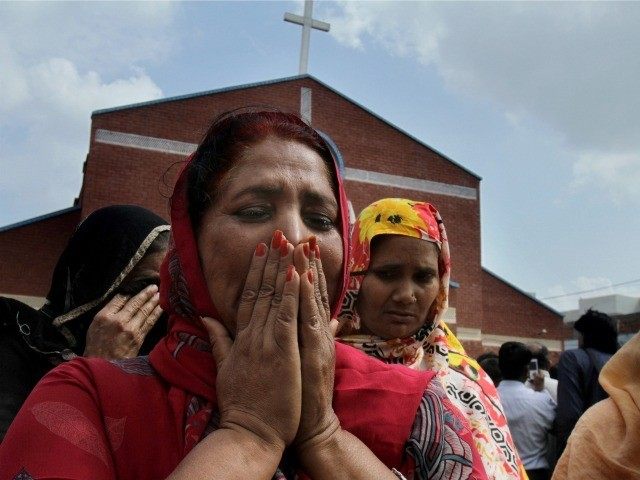Pakistan’s Christians are finding it harder to secure asylum in Britain, despite the rise of their persecution within Pakistan. Over the last two years, the rate of Christians successfully applying for asylum has halved, according to Home Office figures, even as the UK prepares to take increasing numbers of non-Christian asylum seekers from the Middle East.
According to research by the British Pakistani Christian Association (BPCA), Pakistan’s Christians appear to be increasingly ignored by Britain’s Home Office when seeking asylum, as the government does not consider Pakistan’s Christians to be in a state of persecution. Rather, it describes them as merely discriminated against, noting that Christians are allowed to have their own churches and schools, but not acknowledging that those institutions are often monitored by the authorities.
Yet on the second anniversary of the Peshawar twin bomb attack, which killed over 100 people and injured a further 150, and in light of a recent similar attack in Lahore on March 15 of this year, in which 29 people died, the BPCA is urging the government to rethink their definition of persecution when applied to Pakistan’s Christians.
The BPCA recently obtained updated stats on the number of Pakistani Christians seeking asylum in the UK, and on how many were successful. BPCA researcher Nathanael Lewis explained: “A quick analysis reveals that for 2012 and 2013 about 50 per cent ended up being given leave to remain but in 2014 this dropped to 40 per cent and this year so far it has plummeted to less than 20 per cent.
“This is deeply concerning,” he said. “That the percentage of successful applicants has been slashed whilst the situation in Pakistan is steadily worsening for Christians is exactly the wrong direction we should expect to see if the system was working properly.”
It is particularly baffling as overall, asylum statistics have been traveling in the opposite direction. Government figures show that in 2011, 28 per cent of applicants to the UK from all countries were granted asylum. By 2015, that had risen to 41 per cent.
It is also not in step with the situation afforded citizens of other nations. In the year ending June 2015, the largest number of applications for asylum came from nationals of Eritrea (3,568), followed by Pakistan (2,302) and Syria (2,204). But Eritreans and Syrians were far more likely than Pakistan’s Christians to apply successfully – 87 per cent of Syrian and 73 per cent of Eritrean applicants were granted leave to stay.
The charity Open Doors which has sixty years’ experience of working with persecuted Christians ranks Pakistan in eighth place on its World Watch List. The charity notes: “Pakistan’s notorious blasphemy laws are frequently abused to attack minority groups, including Christians. They are often used to settle personal scores, and vigilantes carry out punishments on the accused without trial.
“Dozens of new cases against Christians were filed in 2014. But despite this, the government has ignored any national or international calls to amend the laws. Churches are still free to meet, but they are monitored, and services are sometimes attacked. Christians are treated as second class citizens; Christian women and children are particularly vulnerable to rape and sexual abuse.”
Wilson Chowdhry, Chairman of the BPCA said “[The government’s] stance is contrary to the risk profile by senior academics across the globe and ignores the fact that 700 Christians girls are kidnapped, raped and forced into Islamic marriage every year, a stat produced by Pakistan based Muslim NGO ‘Movement of Solidarity and Peace.’
“The Home Office report also fails to recognise that over 15 per cent of recorded blasphemy charges are laid against Christians, who only make up 1.6 per cent of the demographic of Pakistan – a huge disparity and evidence enough of targeting.
“A government quango the ‘Pakistan Telecommunications Authority’ have banned texting of the words ‘Jesus Christ’, and many churches have been forced to hold meetings at times and days least offensive to local Muslims, with those meetings presided over by local police.”
According to Chowdhry, the British government’s stance has wider implications, as many other countries to which Pakistan’s Christians have also applied for asylum take their cue from the British government’s response.
“It is essential that Britain changes its policy as there are few countries whose reports on humanitarian crises are more respected globally and the UN and UNHCR take their marker from the UK,” he said.
“If Britain makes the right decision the thousands of Pak-Christians who are seeing delays of up to ten years for resettlement from nations such as Thailand, Malaysia and Sri Lanka, may finally see their applications expedited. These asylum seekers are the worst off as they simply find themselves outside the existing system.”
The research opens up the British government to accusations of doing too little for Christian asylum seekers fleeing Islamic countries. Last week the Archbishop of Canterbury, Justin Welby, slammed the government’s policy of only taking Syrian asylum seekers from refugee camps in neighboring countries, as Christians fleeing the civil war and ISIS are often too frightened to enter the camps, meaning that they will not be in line for possible relocation.
Addressing the House of Lords, Welby said: “within the camps there is significant intimidation and radicalisation, and many particularly of the Christian population who have been forced to flee are unable to be in the camps”.

COMMENTS
Please let us know if you're having issues with commenting.